#i know that wasn't the point of the movie. it is a critique of gender roles and the patriarchy so relationships were not the focus
Text
To be honest I think I'm starting to become so apathetic to gender that I could possibly be non-binary but at the same time I am also just apathetic enough to not care about changing my pronouns or doing anything differently about how i present to people
#long gender rant incoming but i've never not identified as a woman and I'll probably always be one#but also i don't think i identify so much as a woman that i find it to be so drastically different to being a man?#like i never identified as a man either and never will but also like. idk we're all just people man#it's the roles we impose on ourselves that makes it seem like there's such a chasm there but there's not#like sure i'm sure on some level being a woman predisposes me to behave certain ways#but i was also fortunate enough to be raised in a household where my gender didn't bar me from playing with or liking things deemed for boy#so when i gravitated towards engineering and action movies and video games i mingled a lot more with boys than i did girls#not to be a 'not like other girls' girl but just because i naturally wanted to surround myself with people of common interests#and that just kind of normalized for me sharing space and thoughts with men as an equal#and sure sometimes men in particular piss me off but mostly just the men who subscribe to the bs role they were given as a 'man'#like the ones who don't think they could possibly relate to me because I'm a woman#like fuck that. obviously. but i also find it hard to identify with movies like barbie that draw such a clear divide between genders#like i remember my biggest problem with the movie is that very rarely did it feel like the kens and barbies ever genuinely liked each other#i know that wasn't the point of the movie. it is a critique of gender roles and the patriarchy so relationships were not the focus#but i also couldn't really see myself in the barbies and i found it kinda hard to fully immerse myself in the message of it#idk. all this to say i am a woman but sometimes i wish i didn't have to make a big deal about it#oh yeah okay no wonder i'm bisexual
6 notes
·
View notes
Text
ok making an actual post about the barbie movie:
so i saw the barbie movie last night. and idk it was like ok. maybe the hype made me have really high expectations. but like i felt kinda alienated and kinda got some gender dysphoria ngl.
part of me related to growing up playing with barbies and growing up seeing misogyny play out on small and large scales. but like the whole movie was so girl-focused. like i get it. it's barbie. but barbie isn't just for girls. and also i'm not a girl (so ok maybe i'm not the target audience). but i'm afab and grew up as a "girl," so i know i am also the target audience?
so part of me felt like an outsider watching cisheteronormativity play out while i was thinking to myself, "thank god i don't have to deal with this" (cause like i don't get it sometimes). but like i still do have to deal with it. i still am seen as a girl/women by people. i am still negatively impacted by the patriarchy.
but also i'm not in some ways cis women still are. like i am also visibly non-binary sometimes which grants me some sort of privilege to not conform. but that privilege comes with a bunch of other downsides too. it's not privilege in the way men (whether cis or trans) get.
i wanted to really love the movie. other people seemed to! and i'm glad. but i just don't think it was made for me (a genderqueer afab person). it seems to be made for cis people.
so yeah, i felt alienated. and i guess that was the point? but i feel like that's kinda a crappy point to make. genderqueer/queer people in general already feel alienated, so i don't think having another movie with that takeaway was super necessary.
like i get weird barbie is neurodivergent- and queer-coded and that's the character we get to identify with (what a crumb). but like it's coded, not explicit (and again, maybe that was the point, but really? that's annoying). and allan i think is non-binary-coded. but like again, coded. i saw myself in those characters. but like the rest of it felt kinda unrelatable.
so idk i guess i'm trying to say, i thought the barbie movie was going to be more queer and relatable to afab genderqueer people like me, but it wasn't. i'm not surprised as this is normal in our cisheteronormative society, but it still sucks and is disappointing.
but also idk if i'm not too autistic to see that the movie actually wasn't for me and i need to move aside. like plz lmk if i should stop critiquing this.
#barbie movie#barbie#queer#genderqueer#genderfluid#non binary#nonbinary#actually autistic#autism#actually neurodiverse#adult autism#actually neurodivergent#queer take on barbie
16 notes
·
View notes
Note
Hi Drones! Love your Mareach fanfics (literally top notch💯). I was wondering, what are your thoughts on the movie (assuming you’ve seen it😅)? I have a few thoughts on it, but would love to hear yours!
Hey there!! I appreciate the ask! (And OMG thank you for reading my fics, that's so sweet of you 😭)
I have finally seen the Mario movie and I do have a lot to say haha, and I'm cool with sharing my broad thoughts this way, but if you're looking for a more in-depth discussion then I'm happy to discuss more in a PM!!
Just a brief disclaimer; my opinion reflects only my personal preference! I don't have any problem with disagreement or anyone who feels differently.
I will say the movie was a lot of fun! It was so surreal to see the Mushroom Kingdom on the big screen, and to hear such familiar melodies in cinematic arrangements. It was downright magical, actually. There was plenty to laugh and be amazed at, and so many references that had me grinning the entire time!
About the plot though 😅 There are pacing and some narrative critiques that I've seen so I won't say anything beyond that. The most important thing for me is I believe in the merit of a children's movie being all fun and silly, but I also really feel like this film went out of its way to avoid social commentary at its own expense. Not for no good reason; I know Nintendo does everything possible to keep the Mario franchise as family friendly as possible. But in terms of an impactful story, it fell sort of flat in my view. I feel as if it could have benefitted from some kind of social commentary beyond it's shot at subverting the damsel-in-distress trope.
(That in particular felt like performative feminism in a sense. Maybe it wasn't, maybe it was a sincere attempt at empowering an iconic character. But the default answer in a lot of media to empowering women these days seems to be "make her strong the way that the men characters are." A girlboss, I guess. It feels performative for me because it reaffirms with the idea that strength in character can only be relevant/seen within masculine qualities, and writers can just say "but it's a woman!" while continuing to disregard more feminine examples of strength. It's like a Get Out of Jail Free Card to acknowledging gender inequality.
Like, the problem wasn't that she's a damsel-in-distress; the problem is how pervasive the trope of damsel-in-distress used to be across the board. Except now, pop culture has sort of swung the other way. The problem isn't the girlboss character, the problem is that the girlboss character is perceived as the only correct way of writing "strong women characters." It's just sort of missing the point. The problem is still the same; women characters are stuffed into the same small box of behavior, attitude, and ultimate role depending on what's trendy at the time. I love the damsel-in-distress trope. I also love the girlboss. But it can be tiring to see that same story over and over again, feeling as if there are only a few options for writers to portray women, and realizing that it represents a sort of confinement of understanding for what women are allowed to be in real life for social acceptance, too.)
I get the desire to avoid politics and social issues. I really do, but in my position (studying social sciences), I see social issues as unavoidable. To go without acknowledging them is to ignore them, and from a story perspective, to go without them also kind of makes it boring?
I've seen the argument that it's a children's movie, therefore it doesn't have to be complicated. That's absolutely valid. I wish I could go back to having no thoughts lol. But it's my personal preference to watch a film that makes me think and consider the world from another point of view. And in response to that argument, all I can really say is basically my favorite genre is children's films that have social commentary. (See The Iron Giant, Wall-E, The Little Prince, Megamind, Beauty and the Beast, literally any given Studio Ghibli film. All of these have something to say about society contained within them.) I kind of wish the Mario movie had an interesting point to make in that context, but it didn't really, and that's okay. That's just why it's not one of my favorite movies.
That being said, there is plenty to love. The character designs were absolutely adorable. The Mushroom Kingdom was more than I could have ever dreamed of, and the way Mario and Luigi's brotherly relationship played out was just so beautifully written 🥺 I love that this will undoubtedly expand pop culture's regard for Mario, and maybe draw others into my silly little corner of the internet where I just sit here and publish my fluffy Mareach fanfiction 😆
#Mario Movie Spoilers#Kind of?#Not really anything specific#But anyway#Like I said I do have a LOT more to say#And I'm still having debates in my own head over it#Like how important is it REALLY to have social commentary?#Does struggles for family approval/validation/acceptance count?#(Not enough imo)#Not looking to be controversial#But this is one of the few things I feel mildly qualified to talk about#“ACTUALLY I've been writing Mario fanfic since I was ten so 🤓”#CLEARLY I am a relevant authority on this topic /s#It's literally Mario#It's not that deep#(But I want it to be)#(And that's my problem)#(So I will continue to make my own goofy fanfic over here)#(mine does have some social commentary sometimes)#Just saying I would be down to help write the next film lol#@ Nintendo and Illumination#Sorry for this preachy take but I do have opinions haha#Diary of Drones#Thank you for the ask!!!
22 notes
·
View notes
Text
Review Blurbs: Barbie (2023)
~General Thoughts~
-I thought this movie would be like... PG. And then it got really emotional when Barbie was looking through Gloria's memories of the days when her and her daughter were at their happiest before Sasha grew up. And then Barbie got called a fascist. So
-Margot Robbie is an insanely talented actor. I'm gonna be honest, I'm not sure how well the movie would've done for me if I wasn't invested in the main character but Margot completely ate the role and made the story of Stereotypical Barbie very endearing to watch
-The pacing was surprisingly good for me, I'm usually really picky about pacing but they were able to balance out transitioning from the silly stuff to serious and back again pretty well, Greta Gerwig you have my applause
-Its an interesting detail that the Real World is still intentionally somewhat unrealistic and caricature-ish similar to the Barbie world is; not sure if that's just Greta's style or if there was a reason for it, made the movie a little jarring imo but I'd love to know why she did it and what effect she was going for
-The fact that Barbie wasn't interested in Ken and rejected him and it was treated as a good thing is just *chef's kiss*
-The Kens fight scene being a colorful musical number with eccentric choreography was so fun to watch I want more
-I don't care what you've been through, nothing could've prepared anyone for that gynecology line. Its such a genius way to remind you that Barbie now has to deal with the biological changes of becoming human. 10/10
-Allan beating up the construction worker Kens was the best moment 10/10
-Speaking of Allan, I loved how Allan was a metaphor for someone who doesn't fit into the gender binary. He was the only non Barbie/Ken, had his own unique name and was always uncomfortable/disappointed with the world around him no matter who was in charge, which was a great way to subtly insert this kind of character. He happily sided with the Barbies to help take down the Kens, embracing all the pink and cheering alongside them when they won, while also looking very sad during the part where the Kens were realizing they failed. Just all of it screamed gender-non conforming to me. I've seen some interpretations saying Allan is a representation of a gay man (being more of a "Ken" presentation wise but finding more of a space among women and being deeply uncomfortable with patriarchy perpetuated by straight men) and some saying he's nonbinary (wanting to leave Barbieland behind and never being satisfied no matter who was in charge); either way, what they did with Allan was very cool and I'm glad some queerness, even if subtle and less prominent, was included in the movie)
-Similarly, Weird Barbie isn't getting nearly enough love. She was one of the most fun characters for me (Kate McKinnon magic, duh) and she like Allan could definitely represent someone out of the cishetero-normative/gender binary (I've seen people saying she's very queer-coded and it honestly makes sense, she tends to dress and act in more un-feminine ways which I think says butch lesbian but its up to interpretation) I am also very gay for her give her more attention cause she deserves it, seriously
-John Cena mermaid
-Simu Liu Ken constantly antagonizing Ryan Gosling Ken over Barbie's attention and being the better Ken within Barbieland is a metaphor for how patriarchy will put women against each other for the attention of men and make women fight each other too much to realize who the real enemy is
-Margot Robbie being acknowledged as "not the best to make this point about ugliness" was fantastic lmao, love the meta-narration
-The way Ken's story arc and the commentary around patriarchy with the incel-pipeline was very strong, and I respect Greta for critiquing it the way she did (I made a full post here )
-Ken and Ken should've kissed. Any of them. All of them.
-Barbie deciding to be human in the end despite her whole journey being about wanting to be a perfect Barbie doll again and her being terrified of flat feet and cellulite but then telling that old woman how beautiful she was and watching humans be normal and mimicking their expressions because even though its scary she wants to feel the way humans do because she sees the beauty in it and its a love letter to women and to people and the complexity of our messy species omfg I'm gonna cry other people said it better than me so go look at their stuff
-Barbie helping out Ken despite everything he'd done because she didn't want things to go back to how they were when Barbies ruled the world, she wanted something different, better, and she helped the person she had every right to want to hurt because we're supposed to be better than those who hurt us
~Criticisms~
-As an add-on to the caricature blurb, I felt a bit weird watching cause Greta's style recreated facets of misogyny as a caricature, so things like patriarchal brainwashing, sexual assault and other very harmful misogynist rhetoric were told in a slapstick way. I was uncomfortable throughout a lot of it, and I'm still deciding if I consider it a genuine criticism to have such matters told in this way or if its just personal preference; would like to know other thoughts if you're willing to share. Regardless, just be aware of it if that stuff's triggering to you so you're prepared for it
-Loved the emphasis on uplifting femininity in Barbie, and I understand the metaphor behind the change, but I can't help feel they pulled a Breakfast Club with Sasha going from her all black attire to suddenly very feminine and with makeup. Being gender non-conforming isn't just for queer people, lots of women are like this and it feels like media makes it seem like this kind of woman is impossible. Not all women wear makeup, not all women are feminine, and I would love for a more masculine/GNC woman character to be able to actually be that. I'll forgive it a bit since Barbies' styles kinda revolve around makeup, and Weird Barbie was consistently butch, just wish characters that are brought up with the prospect of gender-nonconformity could actually stay that way
~Final Thoughts~
Surprisingly good! Don't get me wrong, movies with this style can be good for sure but with the recent surge of mediocre movies I didn't have too much faith. However, I was very happy with how enjoyable and passionate it was. Highly recommend if you like caricature-type works, and/or want to get into some basic feminist ideology in a more fun way that's still very meaningful and heartfelt. Barbie is not just a feminist critique, but a love letter to women, girl hood, and the complexities of humans and how beautiful that can be <3
#phew this one took a while#kept deciding if I wanted to include big blurbs in this post or make them their own post#anyway go watch Barbie its fun#review blurbs#barbie#barbie movie#barbie 2023#greta gerwig
4 notes
·
View notes
Text
Fixing "Boy Erased" (2018)
I recently decided to watch Boy Erased (2018) again, now that we're a couple years out from its initial release (and hype). And I came away with some thoughts.
First, something I think worked. You know that scene near the end, when Jared (Lucas Hedges) is trying to leave the conversion camp and he's racing through corridors and whatnot. That whole sequence works, but there's one moment that really stands out.
Jared attempts to get his phone and Michael (one of the 'camp counselors') tries to physically wrestle it away from him. There's a bit of a fight but eventually Jared makes his way to the bathroom and he calls his mom to come take him away. He then emerges from the bathroom and says to Victor Sykes (who runs the camp), "If you, or anyone else puts their hands on me, I have witnesses." Victor puts up his hands and says, "Nobody's gonna put their hands on you. Why would anybody do that? Come and sit. We're gonna wait for your mom, okay?" Then there's a hard cut to this:
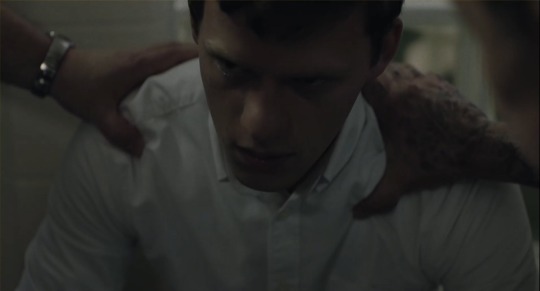
Victor Sykes and Brandon literally laying their hands on Jared and praying. And I love that juxtaposition because it brings to light the violence inherent in this situation. They're restraining him through enforced religious acts. There's violence in this prayer.
And on top of that, it serves as a pretty good metaphor for the whole film. Jared's parents (especially his mother) believe they're helping but really they're hurting. They can't see the violence of their actions in sending him to the camp.
If only the rest of the film was working on this level.
Problem the first: Audience as observer. The film is really about observing its subject, Jared, as he experiences these events. But it isn't about giving us any insight into his perspective or interiority as he does so. The camera is looking at Jared more often that it is revealing to us what he's seeing. Perhaps the most obvious example of this issue is with the perfume ad scene. Jared is on a run and he comes across a perfume ad on the side of a bus stop with a bare chested buff guy. The camera shows us the ad, and then the rest of the scene has the camera (and thus, the audience) placed some distance away as we see Jared first touch the ad, then throw a rock at the ad, and then scream "fuck you" at it repeatedly. The ad itself isn't salacious enough to illicit that kind of response in the average audience-goer, and the camera is so disconnected from Jared's experience that we aren't really gaining insight into why this ad is affecting him in such a strong way. It ends up making it so that scene really does not work.
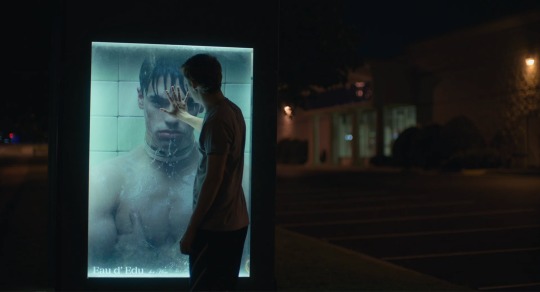
This isn't to critique Lucas Hedges's performance in that scene. It's more to say that all the other elements of that scene make it feel ridiculous - because the audience has not been guided toward viewing that ad in the same way that Jared does in that moment.
The second problem: Casting. To be absolutely clear, this is not a knock against any of the actors performances. On the contrary, I think everyone was pretty dang exceptional. Rather, it's more a conversation about casting choices. Two of those choices really stand out as somewhat misguided: Xavier Dolan as Jon and Emily Hinkler as Lee.
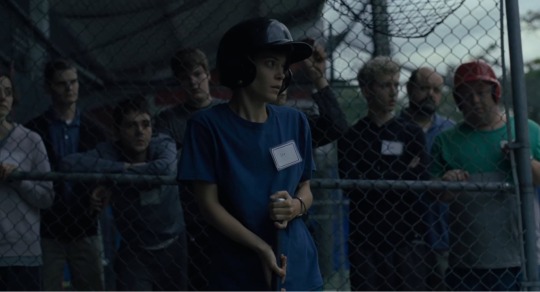
Turns out Emily Hinkler is a nonbinary actress. Lee (the character) is a cis guy who is conspicuously unmasculine. (If you've seen the movie - he's the one who gets hit in the head with a baseball). Casting a nonbinary actress as a cis boy at a conversion camp feels a bit off on it's own in that a conversion camp would be forcing people to adhere to assigned genders at birth. But I could get behind it as a sort of statement, like, a casting decision as direct opposition to the enforced gender binary of a conversion camp. i.e. Why should the movie adhere to the oppressive gender binary that the camp would? However, by casting a nonbinary actress as the least conventionally masculine character - it actually feels like it ends up reinforcing the binary. Lee's defining trait is that he's small and unmanly and, afaik, he's the only one of the male characters who is not portrayed by a cis man.
My issue with Xavier Dolan's casting is much simpler: Jon feels like he was written as a teenager and Xavier Dolan was approaching 30 when this was filmed. Maybe it wouldn't have bugged me so much if I didn't already know who Xavier Dolan was when watching the movie? Like, maybe if you watch it without knowing the actor's age, it works better? But also, the character feels like a teen but isn't explicitly stated to be a teen. So whenever he was on screen I kept wondering if actually part of Jon's situation is meant to be that he is 30 but stuck in a sort-of adolescence due to his relationship with his abusive father. Or did they just cast Xavier Dolan to portray a teenager?
This brings me to the third problem: Not enough of the ensemble. Jared, and thus the audience, spends proportionally, little screen time with the other people at the camp. They are rarely shown talking to each other - especially outside the restrictive observation of the camp's 'counselors.' This could be part of the point - i.e. that the camp is so isolating - but that isolation wasn't really highlighted by the camera/scenes/dialogue...so it really feels more like it's just an oversight. The movie focuses on Jared and his individual story and so the rest just fell by the wayside.
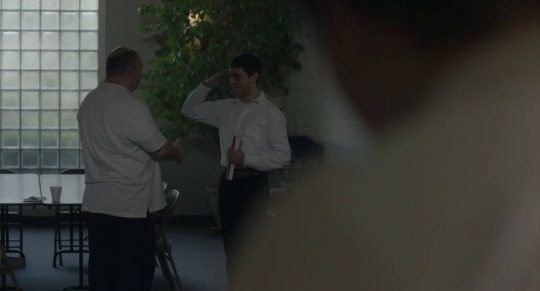
This is really unfortunate because there are some (potentially) great characters in there, especially Jon and Gary. Jon went through the program once before and is now back for a second time. We don't know what happened to make him come back. He appears to be 30-ish but he's staying at a hotel with his abusive father. He is completely invested in the program and treats his sexuality like an addiction. He has even taken it upon himself to forego all physical contact with other men (not even a handshake). His self-loathing is at once horrifying and heartbreaking.
In contrast, Gary (Troye Sivan) knows the entire program is bullshit, but he's playing along for his own survival. He's over 18; he lived with his boyfriend for a year prior to coming to the camp. So that begs the question of how his family convinced him to enter to the program. Also, Gary's so invested in his own survival, that he stays silent and is complacent in the abuse and violence he witnesses against others in the camp. He is both a victim and a bystander (at times).
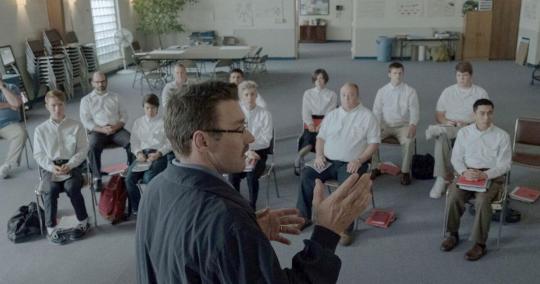
I think this film would've really benefited from spending more time with these characters (as well as Sarah, portrayed by Jesse LaTourette, and Cameron, portrayed by Britton Sear) in the camp and seeing how they all interacted with each other. Give us a sense of their different contexts and perspectives - and give us a better sense of the ways that conversion camps disempower the people sent there (even people like Gary, who knows it's bullshit). It's the thing that makes all the other movies about conversion camps work so well.
Which brings us to the fourth problem: the ending. If we spend more time with the ensemble, we'd either end up with a really long movie or we'd have to cut out something else. Well, folks, we can cut about 10 minutes off the end. Everything after the dinner Jared has with his mother post-escape can go. The climax of the film is when Jared finally decides to leave the camp. The resolution comes when his mother places herself in opposition to Jared's father (which she had never done before) and decides that she's going to take Jared home. And the emotional resolution comes when she admits to Jared that they made a mistake and that they harmed him by sending him to the camp.
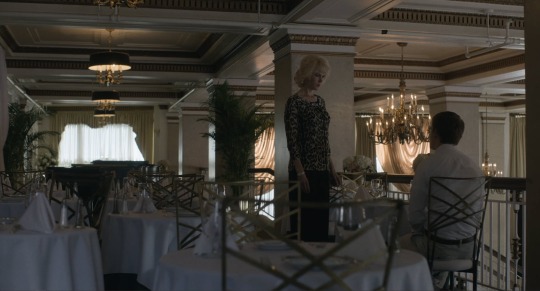
Everything after that is extraneous. We don't really need to see Jared living in a city with a boyfriend, or see him begin to reconcile with his father. His relationship with his father was never the emotional core for the film. Boy Erased is, in some ways, a movie about self-actualization and that's the sort of movie that's best to end with something a bit open-ended. Y'know...a sort of end-that's-just-the-beginning kind of thing. Because the story of Jared falling in love and dating and moving out and gaining the self-confidence to confront his father - well that's a whole other movie. And here it gets shoved into the epilogue, which does the whole thing a real disservice.
Then there are the informational cards at the end. Two stick out as being particularly frustrating. One, "The real Victor Sykes left L.I.A. in 2008. He now lives in Texas, with his husband," feels irrelevant and unnecessary. The audience cares about what happened to Gerrard Conley (who wrote the story and whom Jared is based off of). But why do we care about what happened to the real guy who ran the camp? We don't...except for the jab about him now being married to a man - which feels like it's a more significant point for the cis straight people in the audience than for anyone queer. Turns-out-ex-gay-pastor-was-actually-just-gay-the-whole-time is not revelatory, I gotta say.
Then there's also this:

The emphasis about conversion therapy "practiced on minors," feels a bit disconnected from the film we just watched - which emphasized how abusive and traumatizing it is, even for adults. And in the U.S., all states currently legally allow conversion therapy for anyone 18+. Only Washington D.C. has banned it. And that, to me, is equally egregious, yet it isn't mentioned. The film itself challenges the notion that it's somehow okay for this to be practiced on adults because it's ostensibly their "choice," and then the info cards at the end shy away from that stance by focusing on kids.
I think the thing I find most frustrating about this movie, is the wasted potential. As I said at the beginning of this, there are some moments that really stand out in how they use the medium to convey meaning. There are some choices in how the film uses light and brightness (or lack thereof), that are pretty dang good, too. But ultimately, it's a film I feel so detached from and I think some of what I explained above is part of why.
#boy erased#lucas hedges#xavier dolan#emily hinkler#troye sivan#joel edgerton#nicole kidman#jesse latourette#britton sear
13 notes
·
View notes